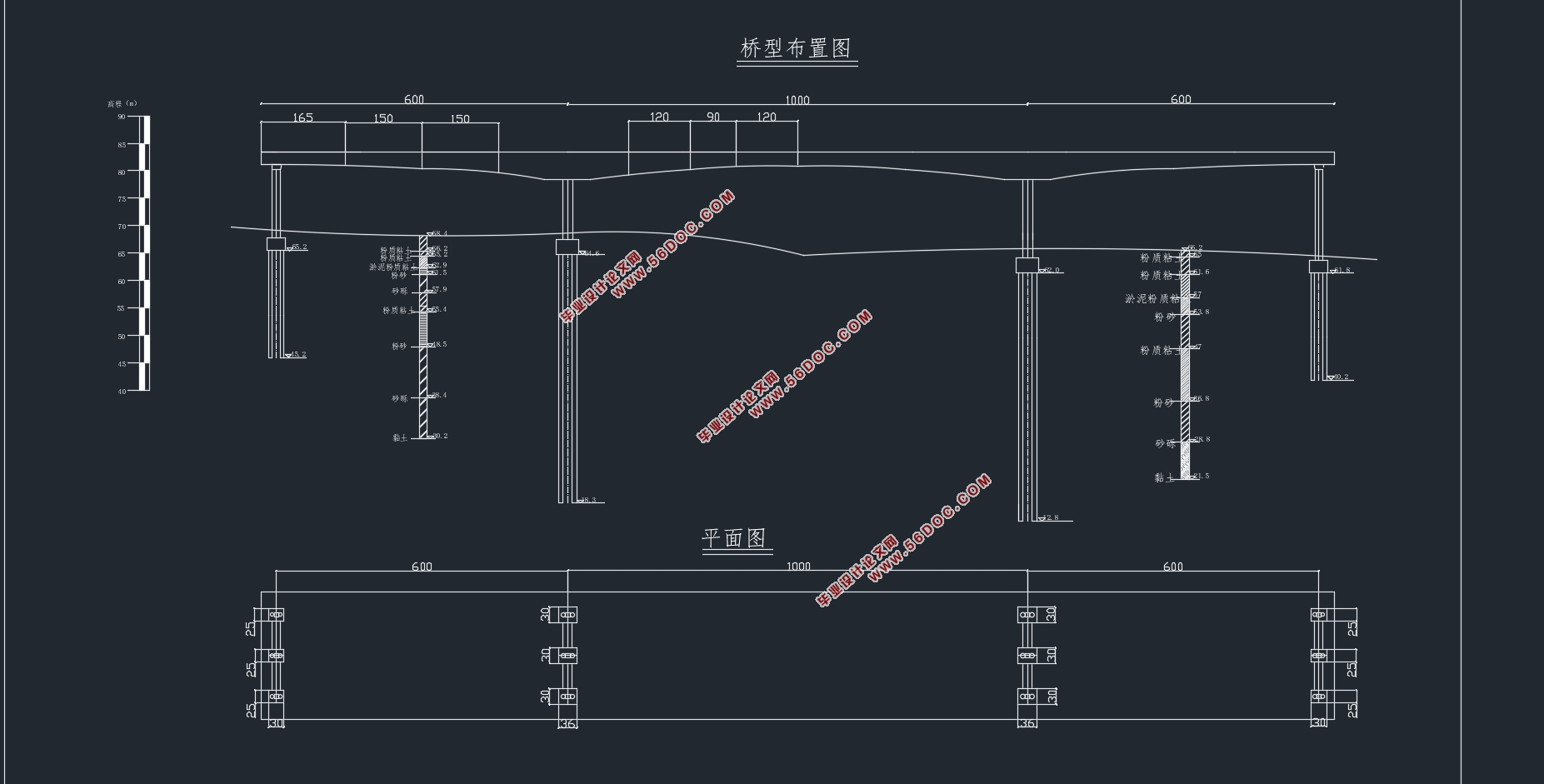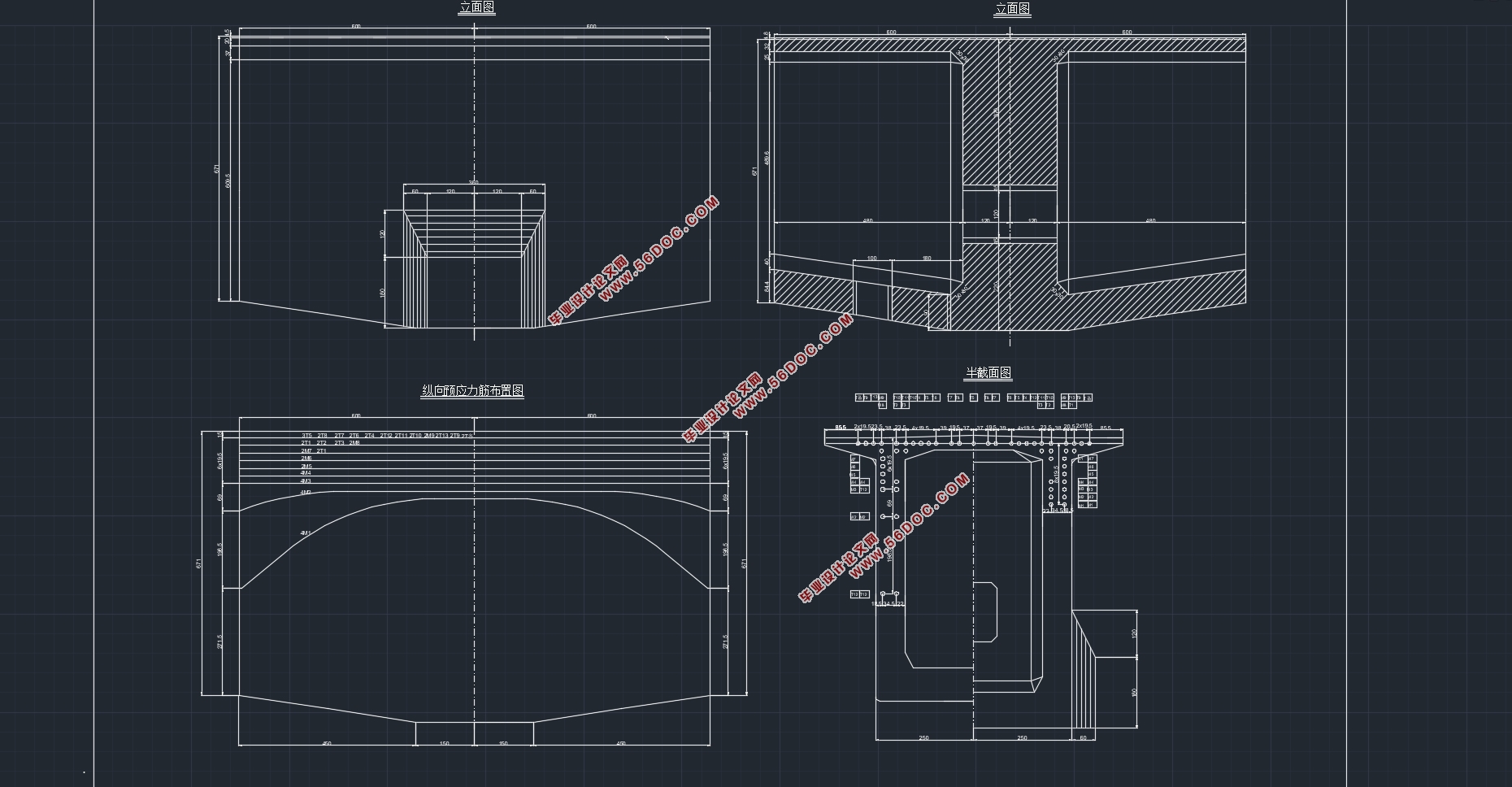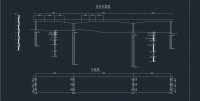潜江铁路支线60+100+60m连续梁桥上部结构设计(含CAD图)(任务书,开题报告,论文说明书12000字,CAD图28张)
摘要
本次毕业设计根据指导老师的设计任务要求,对潜江铁路支线连续梁桥进行上部结构设计。此次设计的是一座铁路桥,计算的主要依据是铁路规范TB05。通过查阅规范,依照规范的计算,确定桥型采用连续梁结构,全预应力构件,变截面。施工方法采用悬臂浇筑法以及满堂支架法。
设计内容主要包括桥型选择、截面尺寸拟定、材料选择、钢索布置、施工方案设计、内力计算、内力组合计算、截面验算。截面验算主要是三个:强度验算、抗裂验算和应力验算。本次毕业设计需要借助midas civil进行桥梁电算,其内力计算以及验算的部分都由midas civil来完成。因此,midas建模以及对模型的修改将是此次毕业设计的主要内容。
关键词:连续梁桥;Midas 建模;挂篮施工;截面验算
Abstract
The graduation design according to the instructor's design task requirements, the Qianjiang railway branch continuous beam bridge for the superstructure design. The design is a railway bridge, the main basis for the calculation is the railway specification TB05. By referring to the specification, according to the calculation of the specification, it is determined that the bridge type adopts the continuous beam structure, the whole prestressed member and the variable cross section. Construction method using cantilever casting method and full house bracket method.
The design content includes bridge type selection, section size drawing, material selection, cable arrangement, construction plan design, internal force calculation, internal force combination calculation, section checking. Section checking is mainly three: strength checking, crack checking and stress checking. The graduation design needs to use midas civil bridge computer, its internal force calculation and verification of the part by midas civil to complete. Therefore, midas modeling and modification of the model will be the main content of the graduation design.
Keywords: continuous beam bridge; Midas modeling; hanging basket construction; section checking



目录
摘要 3
第1章绪论 5
1.1 桥梁的类型与作用 5
1.1.1 桥梁主要类型 5
1.2 设计要点 6
1.2.1 设计基本要求 6
1.3 本次设计的任务要求 7
1.3.1 设计内容 7
1.3.2 提交成果 7
第2章方案设计 9
2.1 方案设计 9
2.1.1 比选原则 9
2.1.2 主桥桥型方案的比选 9
2.2 设计的基本资料 10
2.2.1 设计标准 10
2.2.2 设计材料参数 10
2.3 结构尺寸 10
2.3.1 跨径布置 10
2.3.2 梁高的尺寸初步确定 10
2.3.3 截面类型的选择与确定 11
2.3.4 箱梁截面细部尺寸设计 11
2.3.5 施工方法的选择 14
第3章 Midas建模过程 15
3.1 Midas建模步骤 15
3.1.1 设定操作环境 15
3.1.2 定义材料 15
3.1.3 定义截面 17
3.1.4 定义变截面 18
3.1.5 建立模型的节点和单元 19
3.1.6 定义变截面组 21
3.1.7 定义结构组 22
3.1.8 定义时间依存材料特性 23
3.1.9 定义边界条件以及边界组 24
3.1.10 定义荷载组 25
3.1.11 建立静力荷载工况 26
3.1.12 移动荷载工况的定义 27
3.1.13 定义预应力钢束特性及张拉预应力钢筋 28
3.1.14 施工阶段定义与分析 30
3.2 Midas分析过程 33
3.2.1 分析前处理 33
3.2.2 生成荷载组合 33
3.2.3 恒载计算 34
3.2.4 活载计算 36
3.2.5 进行 PSC 设计 37
第4章预应力钢束设计 40
4.1 预应力钢束的估算 40
4.2 钢筋的选用 41
4.3 预应力损失 41
第5章次内力计算 45
5.1 预加力次内力计算 45
5.2 混凝土收缩次内力计算 46
5.3 混凝土徐变次内力计算 47
5.4 温度次内力计算 48
5.4.1 温度对结构的影响 48
5.5 基础沉降次内力计算 49
第6章内力组合计算 51
6.3 主力组合 51
6.4 主力+附加力 53
第7章主梁截面验算 55
7.1 强度验算 55
7.1.1 正截面强度验算 55
7.2 抗裂验算 56
7.2.1 正截面抗裂验算 56
7.3 应力验算 57
7.3.1 施工阶段应力 57
7.3.2 运营阶段应力验算 58
结语 61
致谢 62
参考文献 63
|







